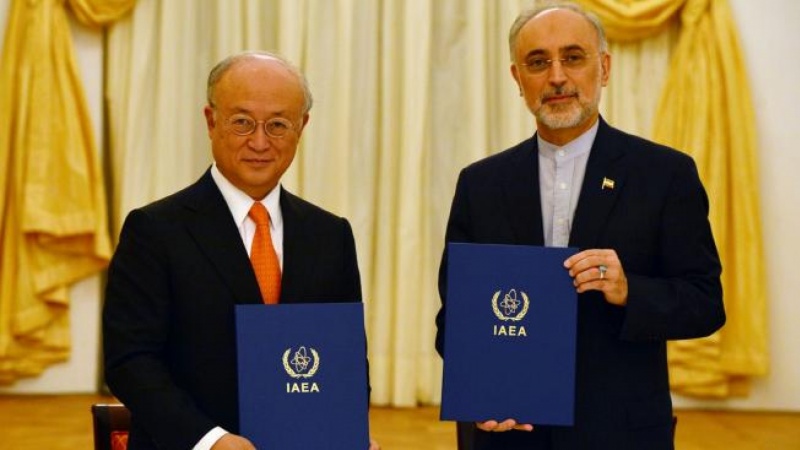Iran Press/Iran news: In its latest seasonal report, the UN nuclear monitoring agency says Iran continues to comply with the JCPOA, and its stockpiles of low-enriched uranium and heavy water are still within limits set by the landmark nuclear agreement.
The finding by the International Atomic Energy Agency (IAEA) is included in its latest quarterly report distributed to member states. In its report on Friday 31 May, the agency said Iran had stayed within key limitations spelled out in the Joint Comprehensive Plan of Action, or JCPOA.
The 2015 deal between Iran and world powers offered Tehran economic incentives -- mainly sanctions relief -- in return for curbing certain aspects of its nuclear program.
IAEA report confirms Iran's compliance with JCPOA
According to the IAEA report, Iran's heavy water stockpile rose from 124.8 tons in February to 125.2 tons as of May 26. That’s still below the 130-ton limit. Its stock of low-enriched uranium was 174.1 kilograms as of May 20, up from 163.8 kilograms in February, but still below the limit allowed by the JCPOA.
The report confirmed that Iran had not enriched any uranium above the level allowed by the JCPOA. "All centrifuges and associated infrastructure in storage have remained under continuous agency monitoring," the IAEA said. The fresh IAEA quarterly report, however, found Iran continued to comply with the JCPOA and said its inspectors had been given unfettered access to Iranian nuclear facilities. This is the fourteenth time the Agency has confirmed Iran's compliance with the JCPOA.
However, Washington's illegal and unilateral abrogation of the nuclear agreement last year, has raised the possibility that the landmark agreement might simply unravel, given the Trump administration's hostility towards the JCPOA, the pressure it is applying to European countries, and the reinstatement of strict and extensive unilateral sanctions against Iran.
 IAEA Director General Yukiya Amano and Vice President of the Islamic Republic of Iran Ali Akhbar Salehi signing a roadmap for the clarification of past and present issues regarding Iran’s nuclear program in Vienna. (Photo: D.Calma/IAEA)
IAEA Director General Yukiya Amano and Vice President of the Islamic Republic of Iran Ali Akhbar Salehi signing a roadmap for the clarification of past and present issues regarding Iran’s nuclear program in Vienna. (Photo: D.Calma/IAEA)
The European signatories to the JCPOA, Britain, France and Germany have so far failed to take any practical steps to shield Iran from the effect of US sanctions, or to make sure that Iran receives the benefits that it should receive under the JCPOA. The much-vaunted 'Instrument in Support of Trade Exchanges', known as INSTEX, a special-purpose vehicle established in January 2019 by France, Germany and the United Kingdom to facilitate non-dollar trade with Iran, has not become operational and the Europeans seem to be dragging their feet in making INSTEX actually work.
America's hostility and European inaction prompts Iran's response
As a response to America's hostile anti-JCPOA moves, and also because of Europe's inaction and foot dragging, Iran’s Supreme Council for National Security announced on 8 May 2019 that Iran is reducing its commitments to the nuclear deal, and informed the five remaining signatories (4+1 Group) about Iran's “diminished commitments” to the nuclear deal.
The statement by Iran’s Supreme Council for National Security referred to articles 26 and 36 of the JCPOA, and emphasized that Iran has every right to reduce its commitments under the deal without actually violating the agreement. Russia has also confirmed that it considers Iran's move as being within the JCPOA. Russia's permanent representative to the IAEA, Mikhail Ulyanov has stressed that Iran's actions are within the JCPOA, and that Iran has not violated this multilateral agreement.
Shifting from strategic patience to strategic action
Iran’s "reciprocal measures" announcement indicates that it is shifting from a policy of strategic patience to strategic action. Clearly, Iran concluded that the current state of play was untenable. Tehran has concluded that it needs to inject a shock into the JCPOA in order to save it, by forcing the European trio (E3) to take more proactive steps, and make sure that Iran receives meaningful and worthwhile economic benefit as a signatory to the agreement. If Europe can provide Iran some economic benefit then we are "back on track", and the Joint Comprehensive Plan of Action (JCPOA) can certainly be salvaged.
The Leader of the Islamic Revolution Ayatollah Seyyed Ali Khamenei, in his meeting with university professors and academics on 29 May clearly stated: "Iran has used the pressure lever which is the reduction of commitment under the JCPOA as announced by the Supreme Council for National Security, but this is not Iran's only pressure lever, and if necessary, in the next stage, we shall use other pressure levers available to us."
The clock is ticking, will JCPOA survive?
Many in Tehran are asking whether Europe has the political will and determination to salvage the JCPOA, or is Europe just a free-rider in the JCPOA in the same way the US is, making Europe unwilling to provide Iran with meaningful economic benefits out of fear it would upset relations with Washington.
Iran has set the clock ticking for 60 days, and the ball is now in the European court. If the Europeans are serious about salvaging the Joint Comprehensive Plan of Action (JCPOA), they need to take urgent action, within the 60-day period, to ensure that Iran receives real and substantial economic benefit from the JCPOA. The Europeans need to make INSTEX operational within the 60-day period, otherwise they shouldn't be hopeful that the landmark nuclear agreement will survive.
101/211
Commentary Writer: Seyyed Reza Mir Taher
Translator: Mehran Derakhshandeh
Read More:
Europe Faces a Big Challenge to Preserve JCPOA
US Anti-Iran policy persists; the re-emergence of sanctions

